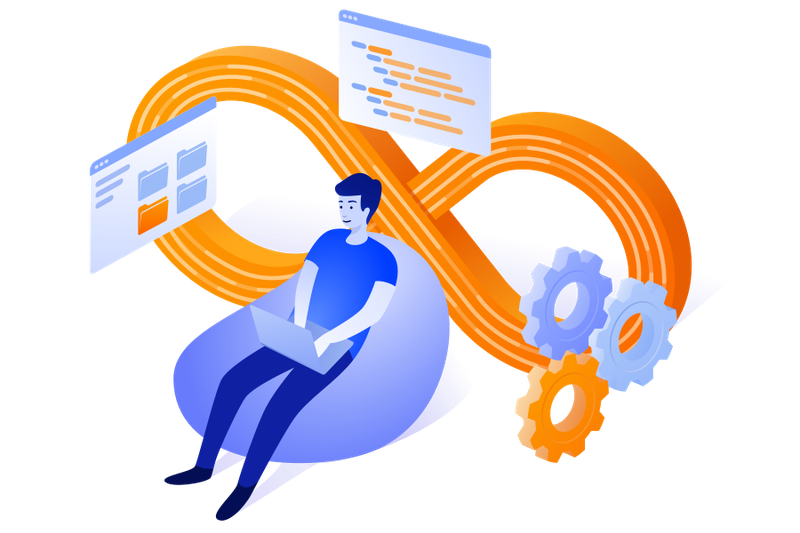The rise of intelligent developer platforms
Let's kick things off with one of the most exciting developments: the rise of intelligent developer platforms. From what we have seen, internal developer portals (IDPs) were heavily piloted from 2022 to 2024 in an attempt to
improve the developer experience. These portals serve as interfaces for developers to access internal platform capabilities, reducing cognitive load and providing golden paths for various technologies. A raft of new products is leading the charge, offering cloud-native platform builders that streamline the developer experience and reduce complexity. We at The Adaptavist Group have developed a challenger platform called
Venue.
IDPs are becoming the backbone of digital transformation, providing
self-service capabilities that improve efficiency, reliability, adaptability, and cost reduction. By leveraging AI, these platforms can automate tasks, generate documentation, analyse code for errors, and even suggest code improvements based on inputs. Organisations are increasingly adopting the platform-as-a-product strategy, where a digital platform serves as the core product, enabling collaboration, innovation, and value creation within an ecosystem. This approach focuses on facilitating interactions between users, developers, and partners, creating network effects, and driving growth.
AI-augmented SDLC in platform engineering
Next, let's discuss how AI is revolutionising the software development lifecycle (SDLC).
AI and ML are increasingly integrated into the SDLC, from planning and designing to development, testing, deployment, and maintenance. AI-powered tools like GitHub’s Copilot,
GitLab Duo, and OpenAI's models are revolutionising code generation, optimisation, and error analysis. AI-driven platforms enhance infrastructure management, data integration, and personalised developer experiences, making the development process more efficient and effective.
For instance, AI-augmented platforms can optimise computing, storage, and network resources, enabling organisations to fine-tune operations and enhance performance. AI-driven data integration and analysis streamline data preparation and management, introducing agility and efficiency in handling extensive datasets. The introduction of AI copilots has already begun transforming the build phase of continuous integration (CI) by assisting developers with code creation and auto-completion. However, the continuous delivery (CD) phase remains challenging due to regulatory and compliance issues that slow delivery. Intelligent DevOps aims to address these challenges by increasing automation while maintaining compliance, security, and quality.
It seems logical to switch from multiple-point solutions to DevOps platforms to streamline application delivery. This will enable a shift to the growing importance of intelligent DevOps in accelerating time to market and improving the software development cycle and developer experience.
Planning and testing with AI
Thanks to AI, planning and testing are getting a major upgrade. The next generation of AI tools is expected to revolutionise these phases of the SDLC. Intelligent DevOps can help teams ensure goal alignment, analyse impacts, and provide accurate estimates for development efforts. AI can also enrich requirements and write tests, enabling test-driven development and reducing the need for expensive test developers.
AI-augmented testing can identify defects earlier in the process, significantly reducing the costs associated with downtime or security breaches. For example, AI-driven test generation can automate the creation of test cases, ensuring comprehensive coverage and improving the reliability of software releases. By focusing on doing more with less, organisations can achieve their goals within the framework of regulatory requirements and business constraints.
Security concerns and AI in DevOps
Security is always a hot topic, and it's even more critical with the advent of AI in DevOps. Recent research has demonstrated the potential of autonomous AI systems to identify and exploit security vulnerabilities. For example, researchers have used GPT-4 to autonomously hack zero-day vulnerabilities, highlighting the need for robust security measures in AI-augmented DevOps. To mitigate security risks, organisations must build solid monitoring systems, manage security problems proactively, and continuously refine source data. AI models should be trained according to new best practices and business needs, and critical processes should not be entirely managed by AI without human supervision.
The European Union has introduced new cyber regulations aimed at enhancing cybersecurity across member states. These regulations, such as the EU Cybersecurity Act and the General Data Protection Regulation (GDPR), impose stringent requirements on organisations to protect data and ensure digital infrastructure security. As a result, DevSecOps practices are becoming increasingly important to comply with these regulations and mitigate security risks.
DevSecOps integrates security practices into the DevOps process, ensuring that security is considered at every stage of the SDLC. The new EU cyber regulations require organisations to implement robust security measures, conduct regular security assessments, and ensure compliance with data protection standards. AI can play a crucial role in enhancing DevSecOps by automating security testing, identifying vulnerabilities, and providing real-time threat detection and response.
For example, AI-driven security tools can analyse code for potential vulnerabilities, monitor network traffic for suspicious activity, and generate alerts for security incidents. By integrating these tools into the DevSecOps pipeline, organisations can proactively address security issues and ensure compliance with EU regulations. This not only enhances the security of their digital infrastructure but also builds trust with customers and stakeholders.
DevOps tooling sprawl
One significant challenge in the DevOps landscape is
tooling sprawl. As organisations adopt DevOps practices, they often find themselves using a myriad of tools for different stages of the SDLC. The toolchain can become overwhelmingly complex, from CI/CD pipelines and version control systems to monitoring and security tools.
Tooling sprawl can lead to several issues. Firstly, it increases the cognitive load on developers and operations teams, who need to learn and manage multiple tools. This can slow down development processes and reduce productivity. Secondly, integrating various tools can be challenging, leading to fragmented workflows and data silos. This fragmentation can hinder collaboration and make gaining a holistic view of the development process difficult.
Moreover, managing a sprawling toolchain can be costly. Licensing fees, maintenance costs, and the need for specialised skills to manage different tools can add up, straining budgets. Additionally, the lack of standardisation can lead to inconsistencies in processes and outputs, affecting the quality and reliability of software releases.
To address tooling sprawl, organisations need to adopt a more strategic approach to tool selection and integration. One solution is to use integrated DevOps platforms that offer a comprehensive suite of tools within a single ecosystem. These platforms can streamline workflows, reduce cognitive load, and provide a unified interface for managing the entire SDLC.
Another approach is to adopt open standards and APIs that facilitate seamless integration between different tools. By ensuring that tools can communicate and share data effectively, organisations can create a more cohesive and efficient DevOps environment. Additionally, adopting a platform-as-a-product strategy can help centralise and standardise tool usage, reducing sprawl and improving manageability.
Organisations should also prioritise regular audits of their toolchains to identify redundancies and inefficiencies. By periodically reviewing and rationalising their tools, they can ensure they use the most effective and necessary tools for their specific needs.
Benefits and challenges of AI-enabled platform engineering
Integrating AI in platform engineering offers numerous benefits, including enhanced decision-making, real-time monitoring, cost reduction, and improved developer support. AI-augmented platforms analyse customer feedback, usage data, and other relevant sources to provide accurate, data-driven insights. This enables businesses to make informed decisions and prioritise development efforts effectively. These platforms offer real-time insights and performance monitoring, suggesting improvements and automating routine tasks. This proactive approach helps identify and resolve issues before they impact users.
By automating tasks like data analysis and product testing, AI-enabled platforms reduce the need for human resources, cutting costs. This is particularly beneficial for organisations facing budget constraints or talent shortages. AI enhances discoverability and efficiency, supporting developers, platform engineers, and managers. This leads to a more streamlined development process and better collaboration across teams.
However, there are also challenges associated with implementing AI in platform engineering. Security risks are a significant concern, as AI systems can introduce vulnerabilities, especially if the training data contains flawed or outdated code. Continuous monitoring and updating are essential to mitigate these risks. For example, AI-generated code may inadvertently introduce security flaws that malicious actors could exploit. The accuracy of AI-generated content depends on the quality of the training data. Poor data can lead to unreliable outputs, necessitating human oversight and intervention. Organisations must invest in high-quality data and robust validation processes to ensure reliable AI outputs. Implementing and maintaining AI systems can be complex, requiring specialised skills and resources. Organisations must be prepared to invest in training and development to build the necessary expertise within their teams.

